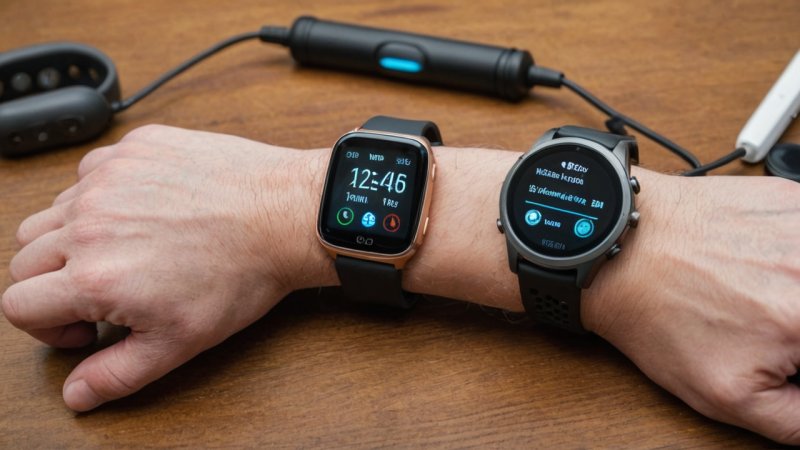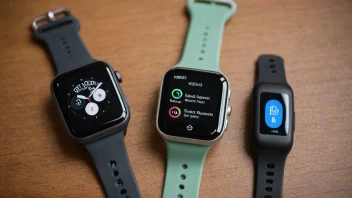As technology evolves, so does the landscape of wearables, particularly biometric devices that track health and fitness metrics. Smartwatches and fitness trackers are two of the most popular categories in this realm, each offering unique features and benefits. In this article, we will explore the differences between smartwatches and fitness trackers, helping you determine which device aligns best with your lifestyle and fitness goals.
Understanding Smartwatches
Smartwatches are multifunctional devices that blend the capabilities of a traditional watch with the functionalities of a smartphone. They offer a variety of features beyond fitness tracking, including notifications, messaging, and even mobile payments.
Pros of Smartwatches
- Versatility: Smartwatches can perform a wide range of functions, from tracking fitness to managing apps and receiving calls.
- Connectivity: With built-in Bluetooth and Wi-Fi, smartwatches keep you connected to your smartphone, allowing seamless access to notifications and calls.
- Customization: Many smartwatches offer customizable watch faces and interchangeable bands, allowing users to personalize their devices.
- Advanced Health Monitoring: Smartwatches often come equipped with advanced sensors for heart rate monitoring, ECG, and even blood oxygen levels.
Cons of Smartwatches
- Battery Life: The extensive features may lead to shorter battery life, requiring more frequent charging.
- Cost: Smartwatches can be significantly more expensive than fitness trackers, making them a larger investment.
- Size and Weight: Some users find smartwatches bulkier and heavier compared to fitness trackers, impacting comfort during workouts.
Exploring Fitness Trackers
Fitness trackers are designed primarily for health and fitness monitoring. They typically focus on tracking specific metrics such as steps, calories burned, sleep patterns, and heart rate.
Pros of Fitness Trackers
- Specialized Features: Fitness trackers are often more adept at tracking workouts and health metrics, providing detailed insights into your fitness journey.
- Battery Life: Generally, fitness trackers boast longer battery life due to their limited functionality compared to smartwatches.
- Lightweight Design: Most fitness trackers are designed to be lightweight and less intrusive, making them comfortable for all-day wear.
- Affordability: Fitness trackers are generally more budget-friendly than smartwatches, making them accessible for a wider audience.
Cons of Fitness Trackers
- Limited Functionality: Fitness trackers usually lack the advanced features of smartwatches, such as app support and extensive notifications.
- Display Size: The smaller screens on many fitness trackers can make it challenging to read notifications or navigate settings.
- No Cellular Connectivity: Most fitness trackers require a smartphone to access certain features, limiting their standalone capabilities.
Key Differences Between Smartwatches and Fitness Trackers
1. Functionality
Smartwatches offer a wide range of features, including fitness tracking, while fitness trackers primarily focus on health metrics. If you seek an all-in-one device, a smartwatch may be the better option.
2. Design and Comfort
While both devices have various designs, fitness trackers tend to be sleeker and lighter. If comfort during workouts is a priority, a fitness tracker might be preferable.
3. Price Point
Smartwatches are often more expensive due to their advanced features. If you're on a budget or primarily interested in fitness tracking, a fitness tracker is a more economical choice.
4. Battery Life
Fitness trackers typically have longer battery life compared to smartwatches, making them easier to maintain over time without frequent charging.
Which One is Right for You?
Choosing between a smartwatch and a fitness tracker ultimately depends on your personal needs and lifestyle. If you prioritize connectivity and multifunctionality, a smartwatch may be the best fit. However, if your primary goal is to monitor your fitness with a lightweight and budget-friendly device, a fitness tracker is your best bet.
Conclusion
Both smartwatches and fitness trackers have their unique advantages and disadvantages. Consider your lifestyle, fitness goals, and budget when making your choice. Whether you opt for the versatility of a smartwatch or the specialized focus of a fitness tracker, both devices can significantly enhance your daily life and fitness journey.






